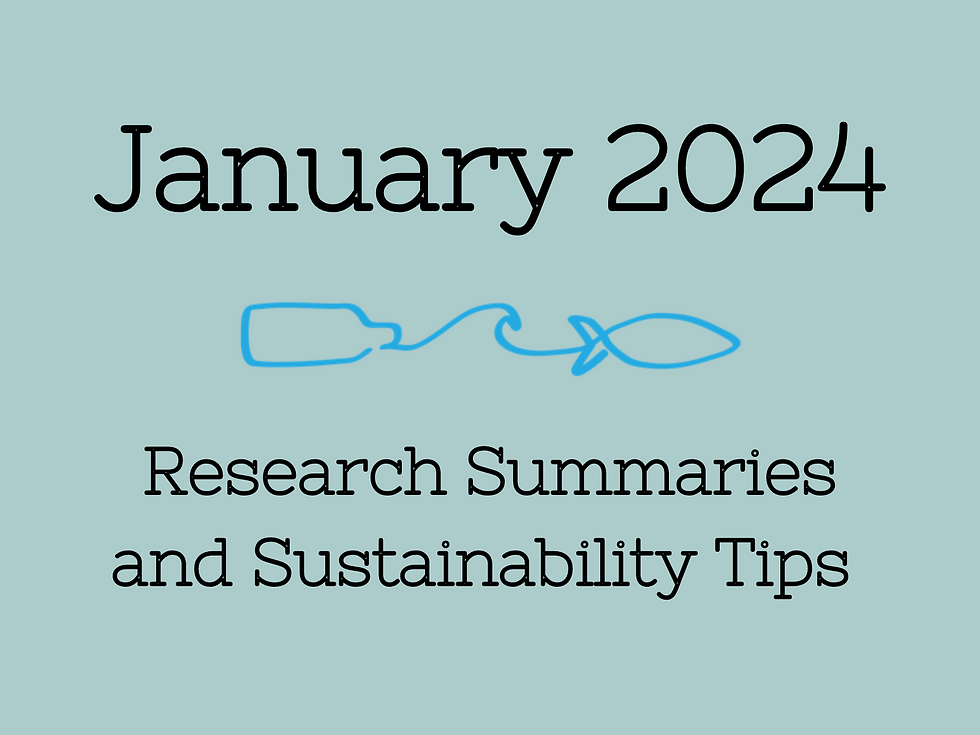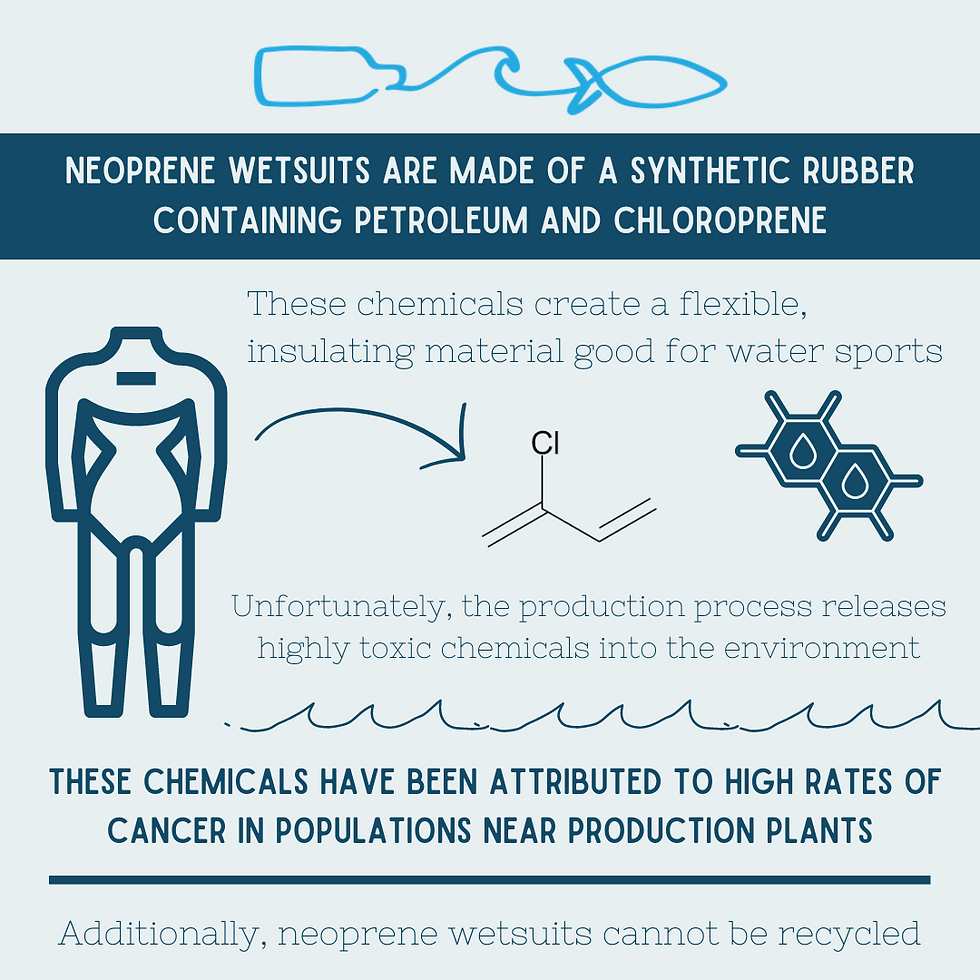January 2024 Research Summaries and Sustainability Tips
- keeptheoceaneverblue
- Feb 5, 2024
- 4 min read
Help us celebrate Everblue's 6th trip around the sun by starting the new year with the latest research summaries and sustainability tips!

JANUARY 18: RESEARCH SUMMARY - NEXT IN NEOPRENE
Anyone who has bought a wetsuit will be familiar with the term Neoprene, but you might not

know that Neoprene is just the commercial name for chloroprene rubber. Neoprene was invented as a synthetic alternative to natural rubber and has become the dominant material for making wetsuits and other insulating products. Emissions from chloroprene rubber processing are highly toxic and have been listed by the US EPA as increasing the risk of cancer. Because of the toxins released and the use of petroleum products involved in wetsuit manufacture, some companies and scientists have been working on more sustainable alternatives in response to consumer demand.
A research team in Sweden experimented with using Forest Stewardship Council certified natural rubber and recycled cotton fabric to create a wetsuit material that was both warmer and stretchier than Neoprene. Because this new material uses natural, renewable resources, it releases far fewer toxins when produced. It is still important to consider other aspects of product creation, such as growing water intensive crops like cotton or transporting Asian grown natural rubber long distances to markets in the US and Europe. However, it is an encouraging step in the right direction in the evolution of wetsuits.
RESEARCH: Thermal and Mechanical Analysis of a Sustainable Alternative to Neoprene Wetsuits. Holmström and Mattsson. January 2019.
JANUARY 23: SUSTAINABILITY TIP - SAY NO TO NEOPRENE
If you’re shopping for a new wetsuit, look for ones made with natural rubber or Yulex. Yulex is the name of the Neoprene alternative used by companies like Patagonia and Finisterre in new generations of wetsuits. Although natural rubber-based wetsuits do not produce the same cancer-causing agents as chloroprene and use renewable resources, they still use new materials that have to be transported long distances. So, reduce the need for new materials by taking care of and mending any wetsuits you already own as much as possible, or buying them gently used second hand.
JANUARY 24: RESEARCH SUMMARY - SOMETHING FISHY
Ocean conservation can be a difficult topic to discuss; we often leave younger people out of these conversations completely, which doesn’t teach children to care for the ocean or its problems. In this study, a NOAA-supported STEAM program called “Something Very Fishy” (SVF) was implemented in select schools to teach elementary children about ocean conservation, and observe how it affected their actions. The results showed increased interest in scientific careers, better understanding of climate change and ocean conservation, but did little to affect their actions outside of the classroom. However, graduate students and teachers involved in these SVF classes did mention an increased desire to communicate more about ocean conservation to future classes.
RESEARCH: Something Very Fishy: An Informal STEAM Project Making a Case for Ocean Conservation and Climate Change (Tallapraga et al. 2021, NOAA)
JANUARY 26: SUSTAINABILITY TIP - TALKING TO TODDLERS
To ensure a bluer future for our oceans, we have to foster a sense of care in younger generations. Don’t shy away from talking to toddlers and elementary-age kids about the ocean. Be honest about the seriousness of climate change and other problems the ocean faces - and lead by example! Toddler see, toddler do. If we teach kids how to care for the ocean, then we won’t have to burden them with fixing things when they grow up.
JANUARY 31: RESEARCH SUMMARY - COP28 TAKEAWAYS
Two of Everblue’s fellow ocean conservationists, Bodhi Patil (@bodhi_patil) and Mark Haver (@oceanswarrior), attended COP28 in December 2023 and we invited them to share some of their main takeaways and thoughts from the conference.
Bodhi Patil, an ocean-climate solutionist, attended COP28 along with the Indigenous Wisdom Keepers Delegation. He noted that one of his biggest takeaways is that “the climate crisis is a values crisis.” He said the Wisdom Keepers argue that we must transcend extractive value systems and re-discover regenerative values to stop the Sixth Mass Extinction and accelerate the just transition to a world free of fossil fuels. This realignment of values is in conjunction with the outcomes of COP28 that call for the “Beginning of the End” of the Fossil Fuel Era (UNFCCC.)
Mark Haver, an ocean-climate advocate, attended COP 28 with the Sustainable Ocean Alliance @soalliance. He noted the ocean is receiving more recognition for the role it plays in mitigating the climate crisis, and there were huge breakthroughs for coral reefs and mangroves. He thought the Global Stocktake, the first attempt for countries of the world to take stock of how we are meeting or not meeting goals outlined in the Paris Agreement, did not include strong enough language to phase out fossil fuels, and some decisions were made without the most vulnerable stakeholders (specifically, delegates from small island states) in the room.
Collectively, while COP28 was monumental in putting the ocean and youth and indigenous voices at the front of our collective actions to address the climate crisis, it was not enough to keep the world’s warming to the 1.5 degrees Celsius outlined in the Paris Agreements, and we have a long way to go to hold nations of the world accountable. Check back later this week for our tips on how to stay involved with these movements. Thank you, Bodhi and Mark for your voices at this important conference, for your relentless good work for the ocean, and for sharing your thoughts with Everblue!






Comments